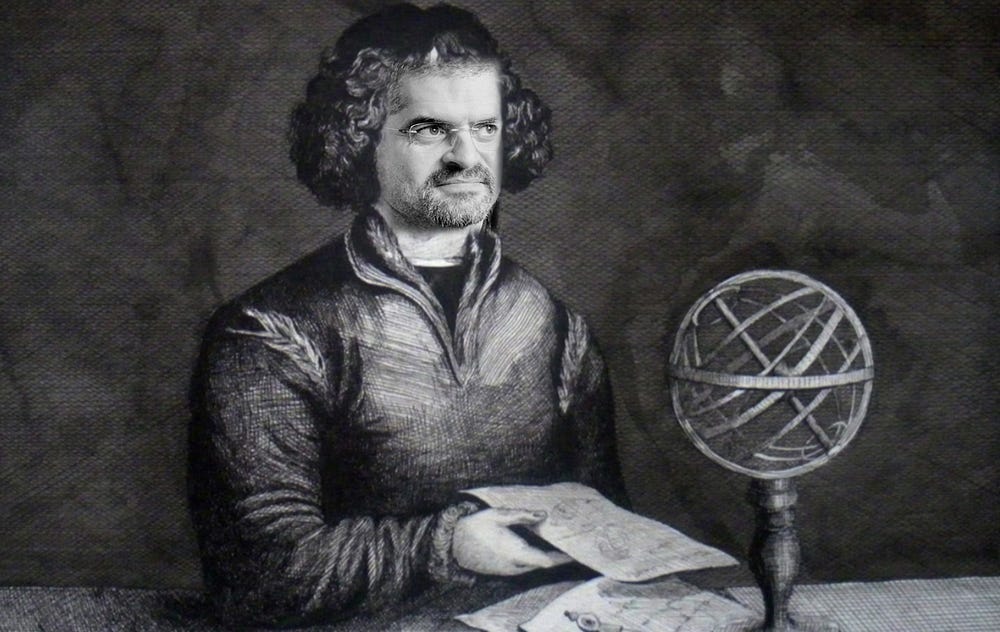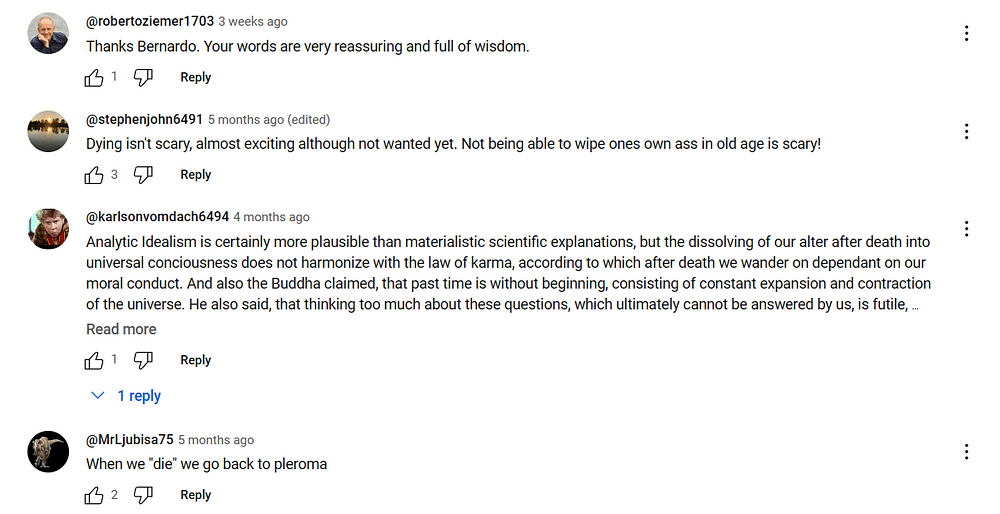Yes. That’s right. There is indeed a self-referential problem with the title above. It contains the words “cult leader”, which can be deemed to be abuse. However, I haven’t done this kind of thing with any other philosopher before. I do it with Bernardo Kastrup because he stridently preaches his religious idealism. So I’m giving Kastrup a taste of his own medicine. Kastrup has also managed to create a cult following around himself. What’s more, Kastrup’s entire religious idealism is ultimately about… Kastrup.

“I have a Google Alert calibrated for more-or-less relevant occurrences of my name in Internet traffic.”
Bernardo Kastrup (see source here).
“Bernardo! You are doing mankind a great service!”
— @adamq8216
*******************************************
Again, the reason for my (as it were) personal attack on Bernardo Kastrup is that he doesn’t do philosophy. He is a religio-philosophical preacher, who also happens to have a large cult following. [See the quotes from his disciples and fans at the end of this essay.].
Thus, because Kastrup is a religio-philosophical cult leader, he rarely sincerely (or genuinely) debates with others.
More concretely, if a philosopher or scientist criticises Kastrup’s positions in any way, then he’ll often write a strident piece — full of abuse and ad hominems — about that person.
So it’s mightily ironic how often Kastrup accuses his critics — as well as those people who simply hold positions he doesn’t like — of using ad hominems!
Kastrup sometimes uses ad hominems both immediately before and immediately after accusing others of doing so. Indeed, he even accuses others of ad hominems whilst actually using ad hominems. Take this example:
“ A part of me fully expected the kind of reaction I got from him [neuroscientist Michael Graziano]: conceptual obfuscation, hand-waving, liberal ad hominem to replace the lack of actual argument, complete failure to address the points in contention, etc.”
Now take these other examples, which are taken from the same single article by Kastrup:
“[T]o watch him [neuroscientist Michael Graziano] babble incoherently in front of you and think, ‘this is actually happening.’”
“[I]t’s one thing to know rationally that the emperor must have no clothes; but it’s another thing entirely to see the emperor [Graziano] standing naked right in front of you.”
“[W]hen it comes to Graziano and [Keith] Frankish, things are different. They truly are emperors with no clothes.”
“Their [Graziano and Frankish] nonsense is toxic, corrosive and pernicious, not only because it is nonsensical, but because — if believed — it could undermine the very foundations of our secular ethics and moral codes.”
“Not only that, he [Michael Graziano] is a Princeton neuroscientist who couldn’t even weave a conceptually consistent counter-argument in his ‘reply’ of little more than 800 words.”
“Our emperors [Frankish and Graziano] are parading proudly in front of us, but they really have no clothes. Watch carefully, ignore the posturing cacophony around you, and you shall see it in horror.”
…
“And so it was impossible to continue the conversation.”
[See many more examples of Kastrup’s abuse at the end of this essay.]
This last statement (about it being “impossible to continue the conversation”) is something that Kastrup has said a few times after debates. What’s more, Kastrup’s abuse and ad hominems aren’t only against people who dare to contradict him. He also abuses people who simply dare to hold different views.
Kastrup most frequent accusation is that other people don’t “understand” this and that. Thus, it’s not enough for him to say that he disagrees with others, or that they disagree with him. No, Kastrup has to say that they don’t understand his Absolute Truth…
He then starts to abuse them - just like a religious fanatic.
Consequently, there’s little point in directly — or even indirectly — debating with Kastrup. And that’s simply because he doesn’t sincerely debate. It’s not worth it anyway because Kastrup will savagely attack those he has just debated in one of his ego-soaked blogs.
In any case, Kastrup is highly unlikely to move even a millimetre on anything. Indeed, he virtually admits that here:
“I believe strongly that I am open-minded, but it won’t be easy for you or anyone else to see it from the outside, because I won’t lightly declare myself open to views that contradict over 30 years of careful thinking about metaphysics. [] Metaphysics began churning inside me when I was 12 years old, following the death of my father.”
As can be seen, three of Kastrup’s many vices can be seen in that passage: (1) His gross and obvious egotism. (2) His penchant for autobiography. (3) His belief in his own philosophical, personal, political and religious righteousness.
So can you debate with someone who already believes he has (or that he actually is) the Absolute Truth? (As Kastrup himself puts it: “I won’t lightly declare myself open to views that contradict over 30 years of careful thinking about metaphysics.”)
There’s another reason why genuine debate with Kastrup is almost impossible: he has created his very own hermetically-sealed religious philosophy.
Bernardo Kastrup’s Religion is Bernardo Kastrup

To repeat. Bernardo Kastrup’s entire religious idealism is ultimately about… Bernardo Kastrup.
It’s all down to Kastrup’s monumental ego.
Yes, it’s down to Kastrup’s embarrassing sense of his own philosophical, moral and political righteousness and superiority.
Not that people should always pay too much attention to the egotism of scientists, philosophers, artists, etc. It often really doesn’t matter much. The problem with Kastrup, however, is that his large ego is actually deeply embedded in all his writings. Indeed, his large ego is deeply embedded in his religious idealism itself.
So note how often Kastrup talks about himself in his blogs, and even in his published articles. Readers will quickly see that Kastrup himself is the very centre of his own philosophy — or, rather, his own religious idealism.
See how many times the word “I” is used in the following passage:
“There is a strange feeling I get every now and then, which is difficult to explain: sometimes, when I get objective confirmation of some conclusion I had already drawn, I get the feeling that I, in fact, hadn’t really drawn the conclusion properly before; at least not as assuredly as when the confirmation comes. At that moment, the conclusion suddenly feels so much more vivid and truer that whatever reasons I had to believe it before seem hazy in comparison. I think to myself, ‘I thought I knew this, but only now do I really know it!’ Can you sense what I mean?”
This post carries on in this vain.
In tandem, virtually all Kastrup’s posts and articles lurch into detailed autobiography.
Take this example (which is one of many):
“As many of you know [sic], I was born in Rio de Janeiro and spent my childhood there, before returning to the ancestral lands of Europe, the ‘mother of all demons,’ as Jung once put it. [] The death of my father, when I was still quite young, sliced my life into two seemingly irreconcilable parts, completely alien to one another. [] It was then that my ‘obfuscated mind’ — my preferred term for what Jung and Freud called ‘the unconscious,’ the matrix of dreams — responded to my emotional ambiguity and stress with a remarkable series of dreams.”
In the article I focus on here, Kastrup even offers us a few quaint little anecdotes, such as the following:
“Not that long ago, I was talking to my other friend while having a beer with him in my backyard.”
Now for a case of Kastrup brazenly selling himself:
“[I]f I were to point out that I’ve published in heavy-weight journals — such as the Journal of Consciousness Studies and SAGE Open — or remind the poster of the fact that well-known academic philosophers — such as David Chalmers — have cited my work in print, or that others — such as Philip Goff — have gone out of their way to engage me multiple times in public, or that yet other academics — such as Keith Frankish and Michael Graziano — have had heated exchanges with me also in print, or that I’ve been invited to debate well-known philosophers and public intellectuals — such as Suzan Blackmore, Michael Shermer, Leonard Mlodinow, Tim Crane, Nancy Cartwright, Peter Atkins, etc. — or that I am constantly on demand for interviews in all kinds of media, including television, etc.”
To be fair to Kastrup, the passage above was actually a response to the following words:
“You seem to be under a strange illusion that acquiring a PhD is itself something making one relevant to anyone, and that publishing articles in no name journals is considered of any relevance. Publishing books is also of no relevance. Nobody is engaging with him. He’s not part of the currently popular topic spaces and their discussions.”
I can’t help believing that many of these academic philosophers and publishers have (to use Kastrup’s own words) “cited” and “engaged” with Kastrup because they’ve picked up on the fact that he has a large cult following. They may well have also picked up on the fact that he’s had a relatively large impact outside academic philosophy and outside academic science. Thus, in that sense, they’ve engaged with him just as they may do with any controversial and cultish figure…
Of course, the difference here is that Kastrup quotes and mentions all sorts of things from both science and philosophy, and practices what he calls analytic idealism. What’s more, Kastrup often claims that he’s committed to arguing his case. Thus, there’s seemingly all the more reason to engage with him.
On a related theme.
Kastrup does very many interviews. ( I counted 45, and then stopped counting. See here.) Most of them are carried out either by fellow idealists or by those bowled over by Kastrup’s confidence, long answers and numerous name-droppings. Thus, Kastrup does give off the appearance of eloquence. However, that’s primarily because he has created his own religio-philosophical worldview. Indeed, this is a worldview which Kastrup has clearly memorised. Thus, after such countless interviews, Kastrup can now reel off his own religio-philosophical worldview — or sections thereof — with ease.
This also means that when an interviewer questions Kastrup, he’ll then go off on one. In other words, Kastrup often repeats the lines and arguments (from his own religio-philosophical worldview) he’s used very many times before. This strategy, at least to some of those unfamiliar with him, may seem like a display of intellectual skill. However, it’s actually very similar to what religious and political fundamentalists do when they recite well-rehearsed lines from religious and political scripture. In simple terms, then, Kastrup’s answers to most questions are stock responses. Indeed, he often doesn’t even directly tackle what has been asked in the first place.
Bernardo Kastrup as Cult Leader

As noted at the beginning, I acknowledged that the words “cult leader”, “religio-philosophy”, etc. may be ad hominems. Strictly speaking, then, Kastrup may not be cult leader in that he probably doesn’t control his followers and fans directly. In other words, he doesn’t actually run and organise a cultish (physical) group, with meetings, rituals, rules, etc. (Who knows, perhaps he does all these things.) That said, there are a few stories that Kastrup demanded complete loyalty (or intellectual obedience) in his Facebook group, as well as on a forum.


Now take these words from Kastrup:
“But when it comes to [Michael] Graziano and [Keith] Frankish, things are different. They truly are emperors with no clothes. Their nonsense is toxic, corrosive and pernicious, not only because it is nonsensical, but because — if believed — it could undermine the very foundations of our secular ethics and moral codes. I, for one, will persist in pointing at them and shouting as loud as I can: ‘Look! They have no clothes!’”
It’s clearly the case that Kastrup doesn’t only have philosophical (or technical) problems with Michael Graziano and Keith Frankish. Kastrup believes that their views
“could undermine the very foundations of our [i.e., his] secular ethics and [his] moral codes”.
Thus, he then got to work abusing them!
So not only is Bernardo Kastrup’s religious idealism threatened by literally any form of criticism or alternative, so too are his (he says “our”) moral codes.
****************************************
Notes:
(1) Kastrup Promises His Disciples Eternal Life

“Thanks Bernardo. Your words are very reassuring and full of wisdom.”
— Roberto Ziemer (In reply to a Kastrup video in which he promises eternal life to his disciples.)
One may wonder why I see Kastrup’s (scare-quoted) “philosophy” as a religious idealism. There are many reasons for this. This subject isn’t the theme of this essay. However, I will cite one single reason (among many).
Kastrup promises his disciples eternal life — an afterlife. He explicitly states that what he calls “core subjectivity” survives after death.
In a YouTube sermon called ‘When We Die and The Meaning of Life’, Kastrup offers his disciples the following “very reassuring” words:
“Under analytical idealism, your core subjectivity remains as you as you go through the process of death, and even after. Because your core subjectivity is the core subjectivity of nature. It’s what exists. Where is it going to go? Life and death happen to it — within it. Life and death are events in core subjectivity, not at the beginning and end of core subjectivity.”
In this video, Kastrup makes lots of poetic and fanciful statements, without any argumentation whatsoever.
These are the catechisms of Kastrup’s own religion.
They must be believed.
They must be followed.
Indeed, judging by the the comments after this video, most of those who replied do follow Kastrup, and they do believe in Kastrup.
It’s also worth noting that Kastrup — like a typical cult leader — boils the all of the evils of Western thinking and science (or at least all its non-idealist parts since the 19th century) to what he calls “materialism”.
Thus, materialism in Kastrup’s religious idealism basically does the work that Satan did — and still does — in Christianity.
(2) More abuse from Bernardo Kastrup
There are hundreds of quotes like the following in Kastrup’s writings. Indeed, they can be found in almost everything he writes. This means that they are far from being “cherry-picked”.
Here goes:
“Dim-witted biologist [].”
“What makes the profound ignorance betrayed by the ‘review’ even worse is the conceitedness and pretentiousness that oozes through it.”
“How can a magazine with ambitions to ‘promote scientific inquiry, critical investigation, and the use of reason’ publish this kind of juvenile garbage?”
“Since he [Philip Goff] was a cosmopsychist just a couple of years ago, then a constitutive panpsychist for the duration of one book, and now seemingly something else already again, who knows what his position will be by the time we debate?”
“[] there is little of substance in [Massimo] Pigluicci’s essay to actually rebut or respond to. [] Unlike Pigliucci, I shall comment based on substance. Yet, I shall also comment vigorously and honestly, not through a smokescreen of passive aggression.”
“Many academic philosophers love to indulge in these tortuous conceptual games that achieve lift off from the firm ground of reality and end up in some other galaxy. This is no news. But I confess to feeling disappointed at Philip [Goff], an academic philosopher I thought would see through this nonsense. I regret that so much energy and time was wasted, during the debate [].”
“I am not doing this just to gratuitously and repeatedly stick my finger in the wound; I’m not trying to do character assassination. But during the debate [Sabine] Hossenfelder attempted (and probably succeeded, in the eyes of many viewers) to make me look like an ignorant fool by flat-out misrepresenting her own output. I ought to defend myself against that overt suggestion, which I consider to have been rhetorical and dishonest, violating all basic debate ethics.”
“Again, [Sam] Harris seems to be, at best, confused and ignorant of the facts; or, at worse, wilfully biased in his appraisal of the available data. [] The irony would be sweet if it weren’t concerning as far as what it seems to say about Sam Harris.”
“[S]ome seem to react to what I have accomplished with covetousness — as opposed to the objectivity that academics are expected to embody — is both a serious problem and a missed opportunity for desperately-needed change. [] many academic philosophers have abandoned reality and now spend their time playing entirely abstract conceptual games of no relevance to you and me. But they still insist that what they do is ‘real’ philosophy. [] Academic philosophy is funded by public money paid out of our taxes. As such, it must be relevant to us.”
“And [Daniel] Dennett isn’t alone. Others, like psychologist Nicholas Humphrey, suggest the same thing [] Despite being a surreal display of in-your-face incoherence, the fact that the video is cladded with the gentle and trust-inspiring demeanor of an affable old man [].”
“I rather think she and the other magicians are fooling themselves; the left hand doesn’t know what the right hand is doing.”
“There is a significant way in which fundamentalist atheists may be unconsciously attributing to others their own cognitive limitations. In psychological terms, this is called a projection. By passing judgment onto their own projections according to the rules of their own private games, they reveal parts of their psychological makeup but assert nothing of relevance about the nature of reality.”
“If I were a subscriber to the Skeptical Inquirer, I would feel offended by this ‘review.’ [].”
“[W]hat kind of psychological disposition makes one feel entitled to publicly criticize something one has admittedly not understood?”
“The target of Jerry Berry’s [Jerry Coyne] latest rant and rage has been an essay I wrote”
“This is one of those embarrassing passages in which Jerry Berry [Jerry Coyne] unwittingly makes painfully clear to the whole world the depths of his philosophical ignorance.”
“[Keith] Frankish has accomplished precisely nothing in his long essay; at least nothing more than tortuous obfuscation and hand-waving.”
The following quotes are a little milder, but still nauseatingly smug:
“[T]his guy really, really does not know what consciousness is! He just doesn’t have the capacity to introspect and self-reflect enough to recognize his own raw awareness.”
“I think the strongest thing materialism has going for it is that most materialists do not actually understand or recognize what materialism entails and implies.”
“Compounding the problem, many people — even otherwise intelligent ones — don’t appear able to recognize the nature of their own raw awareness through self-reflective introspection.”
“[H]ow two otherwise intelligent people can be so biased against much more reasonable metaphysics: the problem is not that they don’t understand these other metaphysics; the problem is that they don’t understand materialism.”
(3) Bernardo Kastrup’s Disciples and Fans
“Bernardo sir you are just mind blowing or should I say ego blowing. [] I am really thankful to you sir.” — @dheerajsood4162
“[] Bernardo! You are doing mankind a great service!” — @adamq8216
“Absolutely powerful and empowering. So in awe. SO happy you’re around, my darling Bernardo!!” — @elzen57
“I have heard that Bernardo is the most impactful philosopher of our time. I think it’s actually true.” — @krishnapartha
“God I love Bernardo. His writing is amazing & so clear.” — @elecsomify
“I am in awe of his clarity of thought. What a beautiful mind!” — @Dani68ABminus
“Kastrup is one of the great thinkers of our time.” — @Anarkokommunist
“Kastrup blows me away every time he speaks. I love watching any content that includes him.” — @tartarus1478
“Bernardo is an extremely impressive human.” — @patrickl6932
There are hundreds of these kinds of reply after the YouTube videos in which Kastrup features.
See also ‘Bernardo Kastrup’s Fan Club’ on Facebook here.
(*) See my essays ‘Bernardo Kastrup’s Spiritual Take on Psychedelic Experiences and Cosmic Consciousness’, ‘The Idealist Philosopher Bernardo Kastrup vs. Materialism’, ‘Bernardo Kastrup (the Well-Known Cosmic Idealist) and His Afterlife’ and Reality is a Metaphor: Bernardo Kastrup on the Vibrations of Cosmic Consciousness’.
My flickr account and Twitter account.






No comments:
Post a Comment